Introduction
Most foods consumed by most people are packed with unhealthy substances. Or are there foods that, when regularly consumed, contribute (significantly) to the decline of your health? There should be a warning label on these items! The foods you should eat every day should be rich in nutrients like vitamins, minerals, antioxidants, phytochemicals, and enzymes because these are powerful in promoting optimal health. Eating foods of this kind will help you achieve optimal health, which is characterised by having no signs of illness, disease, or symptomology. The healthiest meals and diets available today place a strong emphasis on real, complete foods: lots of fruits and vegetables, whole grains, lean meats, and low amounts of salt and sugar. Here are 10 healthiest items you should add in your diet daily, some of which are readymade breakfast for you.
It’s a wonderful place to start if you’re wanting to add more nutritious foods to your diet, even if there are many other good-for-you items that didn’t make this specific list, such as lentils, bananas, and beets. Here are 10 healthiest items you should add in your diet daily, some of which are readymade breakfast for you.
“It Is Health That Is Real Wealth and Not Pieces Of Gold And Silver.” – Mahatma Gandhi, Lawyer, and Anti-colonial Nationalist
TOP 10 HEALTHY FOODS YOU SHOULD BE EATING
1. Berries
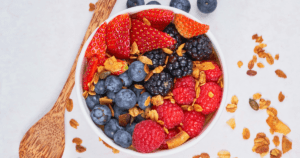
Every type of berry is a fantastic source of fiber, which most Americans don’t get enough of. Fiber keeps you feeling full, is beneficial for your heart, and helps keep your digestive system healthy and functioning properly. Make sure to mix it up; all berries are beneficial to your health. When berries aren’t in season during the winter, pick up frozen berries (without sugars) and use them in yoghurt, smoothies, or porridge. With 8 grams of fiber per cup, raspberries—one of the finest breakfast foods for weight loss—also contain ellagic acid, a substance with anti-cancer qualities. The same number of blueberries contains only 4 grams of fiber, but they are also rich in anthocyanins, antioxidants that may support memory function.
Have 1/2 cup blueberries every day, but if you are diabetic or on blood-thinning medicines, ask your doctor first.
2. Yogurt
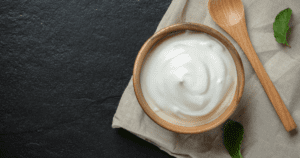
Probiotics, or “good bacteria,” found in yoghurt support the health of our digestive systems. Also abundant in calcium. Nearly half of the daily required intake of calcium is delivered by just 1 cup of yoghurt, along with phosphorus, potassium, zinc, riboflavin, vitamin B12, and protein. When possible, choose plain yoghurt and go for Greek-style for an even greater protein boost. Yogurts with flavours frequently contain a lot of sugar that adds calories without any nutritional value. Greek yoghurt contains more protein and less natural sugar and lactose than normal yoghurt. This equates to more body fat loss and improved health because you are receiving a nutritional punch of calcium ounce for ounce (one cup has roughly 25% of your daily requirement). Yogurt also has beneficial bacteria that are calming.
When purchasing yogurt, opt for high-protein, low-fat Greek yogurt and have it for breakfast or snack.
3. Nuts
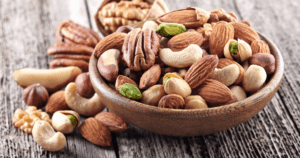
Why are nuts so limited? They are abundant in magnesium and heart-healthy polyunsaturated fats, two minerals. Additionally, these nutrients might provide defence against insulin resistance, which can result in diabetes. Free radical damage to your body can be lessened by antioxidants present in nuts, such as ellagic acid and resveratrol. This lessens inflammation, which may minimise the risk of cancer. Additionally, nuts include insoluble fiber, which research indicates may support healthy gut bacteria and help you stay healthy. Toast with nut butter, a handful of nuts for a snack, or your own easy trail mix are all good options. Must add in your breakfast as it is considered as the healthiest item to add in your daily diet.
Have 10 almonds daily. Soak them the night before to absorb nutrients better.
4. Spinach
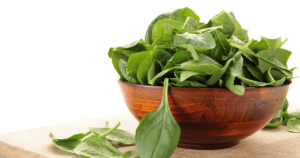
Like other dark green vegetables, spinach is a great source of beta-carotene, a potent antioxidant that has been found to prevent and treat cancer and heart disease. Several significant phytochemicals, including lutein, which helps stop age-related macular degeneration, are present in this dark leafy green. Lipoic acid, another component of spinach, aids in the renewal of the antioxidant vitamins C and E. Lipoic acid plays an important part in energy synthesis and is very good at controlling blood sugar levels. Yes, spinach also has a healthy amount of the crucial omega 3 fats. One vegetable crucial to optimum health is spinach. This is a must add healthiest food to add in your daily diet.
Steam and remove some of the harmful oxalates but retain vitamins C, E, and folate and essential minerals.
5. Eggs

Eggs, a high-quality vegetarian protein source, may help your meal last longer. About 70 calories and 6 grammes of protein are included in one egg. Additionally, lutein and zeaxanthin, two antioxidants that support eye health, are found in egg yolks. In fact, lutein and zeaxanthin are associated with a lower risk of age-related macular degeneration, the primary cause of blindness in adults over 65, according to study published in PLOS One in 2019. Additionally, lutein may protect your skin from UV deterioration.
Having 1 egg a day is the easiest way to get some protein in your diet.
6. Apples

They are high in fiber, vitamin C, and numerous antioxidants. They are very filling and make the perfect snack if you find yourself hungry between meals. Apples came in second for maximum antioxidant activity among other regularly consumed fruits in the US. The apple’s peel contains a lot of its amazing antioxidant power! So, choose organic apples instead of peeled ones. Apples provide 2-3 g of fiber, which isn’t much, but half of this is pectin, which has a significant impact on your health. Particularly in the areas of heart health, diabetes, cancer, stroke, and brain health, apples promote improved health. This is one of the healthiest item to add in your daily diet recommended by every doctor almost.
The USDA recommends at least 1 whole fruit a day. Apples are good even for diabetics.
7. Coconut oil
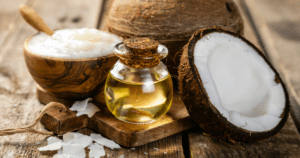
The scientific term for palm plants that produce coconuts is Cocos Nucifera. They probably came from Southeast Asia and India. Today, coconuts may be found growing in warm regions of the world like the Caribbean, parts of Africa, and South America. The edible white interior flesh of a coconut, also known as the “kernel,” is known as coconut meat. Coconut oil, coconut cream, coconut milk, and dried coconut can all be made from coconut meat. Of course, you can consume it raw as well. According to research, coconut flesh has a variety of possible health advantages, including nourishing lipids.
Coconut meat provides nutritious fats and various other potential health benefits.
8. Sweet Potato

It contains a lot of beta carotene, a powerful antioxidant that increases blood levels of vitamin A, especially in children (1, 2Trusted Source, 3Trusted Source, 4Trusted Source). Sweet potatoes are sweet, nutrient-dense, high in fibre, and satisfying. They can be fried, baked, steamed, or boiled for food. The most common hue of sweet potatoes is orange, although they can also be found in white, red, pink, violet, yellow, and purple. Sweet potatoes are referred to as yams in some parts of North America. Since yams are a distinct species, this is a misnomer. Regular potatoes and sweet potatoes are only distantly related. This is one of the healthiest item to add in your daily diet.
Cooked sweet potatoes are relatively rich in fibre, with a medium-sized sweet potato containing 3.8 grams.
9. Nut Butter
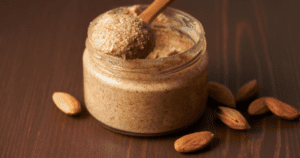
5% to 10% of persons have a food allergy. Common triggers include tree nuts like pecans and almonds as well as peanuts, which are legumes like beans and peas. Even something that has meet nuts might make you extremely allergic, resulting in swelling, vomiting, and diarrhoea. It might even irritate your throat, making it difficult for you to breathe or speak. This is a condition known as anaphylactic shock, which can be fatal. Nut butters typically offer a satisfying combination of good fats, protein, fibre, and vitamins (such as vitamin A, vitamin E, and B vitamins) (like iron, zinc, magnesium, and potassium)
Nut butters contain several important nutrients, including: 1 protein. 2 healthy fats. 3 fiber. 4 vitamins and minerals. 5 phytochemicals.
10. Chia Seeds
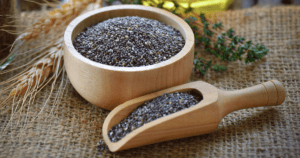
Chia seeds are rich in fibre, omega-3 fatty acids, high-quality protein, as well as several necessary minerals and antioxidants. They might lessen diabetes and heart disease risk factors, blood levels of heart-healthy omega-3 fatty acids, and intestinal wellness. Chia seeds have a smooth, shiny appearance and are tiny, flat, oval-shaped, and shaped. They might be white, brown, or black in hue. These seeds are quite adaptable. They can be simply sprinkled on top of salads or yoghurt, soaked, and added to porridge, turned into pudding, or used in baked goods. One of the healthiest item to add in your puddings.
By weight, they are 6% water, 46% carbohydrates (of which 83% is fiber), 34% fat, and 19% protein.
Conclusion
It’s crucial to limit foods and beverages containing added sugars, such as high fructose corn syrup. You will consume more calories from added sugars without receiving essential vitamins and minerals. Many desserts, canned fruit packaged in syrup, fruit drinks, and non-diet drinks all have added sugar. Be sure to look for additional sugars like high-fructose corn syrup in the list of ingredients on food containers. Alcohol-containing beverages increase calories, therefore it’s a good idea to moderate your alcohol consumption. Even rural residents’ eating habits have altered, not only those of the metropolitan elite. Most of the physically active rural inhabitants have become less laborious because of work mechanisation. Consumption of food either grew or stayed the same in volume. For more ideas to have healthy diet look at tips for healthy lunches and Foodie and fit can go along.





3 Comments